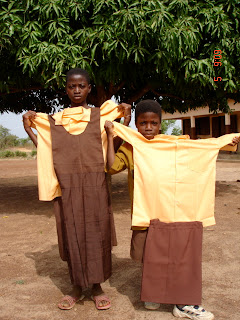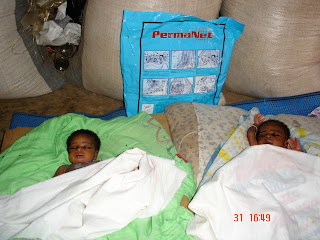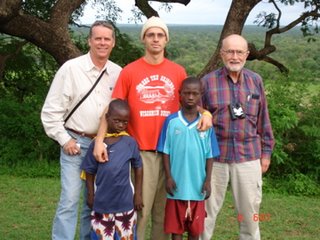
27 March 06
Friends & Family:
For better or for worse, the era of television has arrived in Agou. I figured it was coming sooner or later. And if
my TV commercial upbringing has taught me anything, it’s that one should never postpone for tomorrow what can be enjoyed today. Nike – just do it. Snickers – why wait? Campbell’s soup – mmm, mmm good.
How did it happen? With money from generous people at Trend Homes and consent from Agou’s village elders, I purchased a 21” TV, generator, and antenna for the chief’s palace. The chief’s palace was chosen because it is a public space built by the community for town meetings and such. Its no Taj Mahal but at least now it can showcase live soccer. The fact that Ghana will be playing America this June in the World Cup did factor into the decision, a little.


Beyond soccer, there are important reasons we got a TV. For one thing, the entertainment value is hard to equal. I lived for 5 years without eating meat. I seriously doubt I could go 5 years without watching the telly. Could you? For those who say they could, what if that included no movies either? To be sure we are ambivalent about tv. We criticize its effect on society and yet we own three and watch it 20 hrs/wk or more.
But more than entertainment, I feel TV has the power to improve understanding of other cultures. Let me explain. The Peace Corps has a three part mission:
A) To facilitate development through skills transfer and capacity building at a grassroots level
B) To promote a better understanding of America on the part of host country nationals
C) To promote a better understanding of the host country on the part of Americans
Most volunteers do a good job fulfilling the first part. David Branigan from Philadelphia started a youth drama club that
performs in and around Accra to educate people about HIV. Tonya Stephenson from Salt Lake City worked with her local tourism board to develop postcards of the scenery and shrines at her site. Postcard profits help finance the local museum and community sanitation projects. Brett Meyers from Chicago showed his farming community how to improve soil fertility through composting and crop rotation. And so on.
All volunteers carry out the third part to some extent. Every letter home, every picture of village life, and every American who visits a volunteer at site is improving America’s understanding of the world. And this is why I spam all y’all from time to time with my stories of life in Ghana. I write you not because I particularly like you but because it’s my job.
It is the second part of the mission that normally gets neglected. One of the great ironies of Ghana is how much the people here want to go to America and how little they know about the place. They know America is wealthy, guns are plentiful, and a lot of white Christians live there. Beyond that little more is known. You have no idea how many people thought I was returning to the States when I told them I was going to London. And good luck describing a New England blizzard to someone who shivers when the temperature drops to 65 F.
But Hollywood can help. It’s a far cry from reading the encyclopedia, but movies, sporting events, and network news DO
promote a better understanding of the world. I realize this is a strange concept. But it’s hard to deny what a powerful medium the motion picture is. Think of how many times you’ve cried when watching a movie or laughed so hard it hurt or been so scared you couldn’t watch.
Let’s be clear, I’m not saying TRL and Fear Factor are elevating the human race. What I’m saying is that the technology of
television has the ability to unite people across the globe through a common experience of emotional images. Just imagine what the global response to last year’s Indian tsunami would have been without TV. Every disaster relief organization knows how vital it is to get visual images of the disaster into people’s living room.
If you watch TV and don’t like it, fine. Your head won’t be blocking my view of the World Cup game.

---------------------------
Ok, that’s enough on the philosophical justification for our TV purchase. On to the fun part: people’s reactions to various video shows. The first movie we watched was *Wizard of Oz*. Their reactions were funny. They didn’t understand Dorothy’s strong affinity for Toto (Ghanaian: what is that thing? Me: it’s a dog. We love dogs in America). They were amazed by the Kansas farm, especially the pig pen and scarecrow. Hard to believe the farms in that old film would be more advanced than a
Ghanaian farm today. Some were frightened by the Munckins, yet the Wicked Witch of the West surprised nobody. Belief in witches is still very much prevalent in my village.
So far their favorite movie is Eddie Murphy’s *Coming to America* – for obvious reasons. Three scenes were noteworthy. The scene of poverty in Queens elicits surprise. Yes, I tell them, poverty exists in America. Believe it or not, during the barber shop scenes I am the only one laughing. They feel the barber is very rude to his customers. Moreover, the dialogue is ripe with American cultural references they don’t get. Then the church scene with Arsenio Hall as pastor in front of bikini models invariably draws moans and criticism. I suppose these scandalously dressed women in their most sacred institution is no laughing matter.

*Princess Bride* and *Finding Nemo* were popular. *Memento* and *Tommy Boy* were not. The big surprise has been *The
Graduate* with Dustin Hoffman and Anne Bancroft. A lot of dialogue and very little action usually = boredom for the mostly non-English speaking audience here. But the story of an older woman seducing a young man they intuitively understood and enjoyed.
-----------------------------------

Vote of Thanks
The generous people at Trend Homes have so fare made possible the construction of 45 household latrines, 50 mosquito bed nets for pregnant woman and infants, a hand pump borehole to increase clean water supply, cement and paint to renovate the chief’s palace, a village bike, and new uniforms for needy girls to encourage school attendance. In other words, much more than a TV has arrived. The people here thank you.
Also, I want to send a sincere thank you to Kevin Sullivan of the Mesa Soccer Club and Erik Johnson at DHL for the huge shipment of soccer goods. Last Tuesday, the village elders came to my house at 6:30 am with 42 yams and a bottle of local gin as a token of their appreciation for “the fooball disting.. boots, balls, jerseys.. Everything!” It was touching. You put a
smile on a lot of people’s faces.

Ok, I'm tired and don't feel like writing a top 10. Here's a couple top tens submitted by ?? can u guess who.
Top Tens Myths About Harvard Law School
10) Its a terrible place: Cambridge is a sweet area. great restaurants, great bars, and even though its cold as shit, snow and
seasons have their upsides as well
9) The professors don't care: The professors are ridiculously intelligent. Even if you disagree with them, you can't help but be impressed by their passion and endless knowledge on the subject.
8) The workload is ridiculous: Law School is still a lot better than having a real job. From what I have heard from my banking buddies, and for that matter all my friends with real jobs, I would say that any grad school, no matter how stressful, i better than a 9-5 or worse a 7-11.
7) The people are terrible: The people here are not all awesome, but when there are 1500 in total, its not hard to find some people who like to have a good time, and who also can carry a conversation and make you think about things differently. Particularly for me, I have found some people who are among the funniest and smartest that I have ever met in my life
6) The ladies are not so attractive: This one I can't totally disagree with, but there are a few. though I gotta say that Claire looks better and better each day with the background comparison here.
5) The socratic method is terrifying: Its not that bad at all. Unlike the movie depictions in The Paper Chase, professors here are all polite and never mock or antagonize a student who is struggling.
4) The housing is nice: I at least thought this, and it couldnt be further from the truth. My dorm is like a prison. Luckily mom came and saw it and decided to fix it up and now its pretty nice, but it remains the worse residence I have ever had.
3 )All you meet are rich white men: This isn't entirely false, but compare it to 50 years ago, the fact that classes are now 50% women, and greater and greater numbers of minority students, its not the same homogenous class it was back then.
2) Tuition is reasonable: I don't really think this is a myth, but man it is wrong and man it pisses me off. There is no reason why law schools need to charge so much, and especially no reason why Harvard needs to when it has billions of dollars (no joke). The worse part of it is that it forces students to take firm jobs to pay off their debts when many may otherwise pursue other jobs that pay considerably less. At the end of the day, they charge as much as they do because they can, but that doesnt make it right
1) Harvard Law is the toughest law school: I actually think that Harvard Law may be the easiest law school in the country, its just the toughest to get into. Besides the fact that the curve is set at B-average, we take one less class than most other schools, and no one has to worry about getting a job.

The top ten reasons why being in Peace Corp Ghana is better than medical school in Wisconsin:
10) No homework! No Finals, no classes!
9) Ghana heat doesn't sound too bad compared to the Wisconsin snow right about now
8) Plenty of time to read for pleasure. (The last books that I read were Biochemistry, Human Anatomy, and Embryology)
7) The smell of Ghana can't be much worse than a long night in the Anatomy Cadaver lab
6) No back to back all nighters
5) $5 a day to live on sounds great compared to shelling out 45K/yr for tuition
4) Spending the night in a hut doesn't sound so bad compared to spending the night in a study room
3) Nobody here follows me around treating me like a celebrity
2) Trying to memorize 700 pages of biochem notes for a comprehensive final is not all its cracked up to be
AND LASTLY:
1) I am sure you are helping a lot more people (and probably giving more medical advice) than I am...they wont let me
near a real patient for another 1.5 yrs
all the best,
nana kofi

...........................................................
If you are a racist, I will attack you with the North.
-Abraham Lincoln


